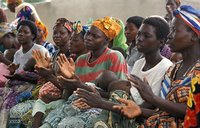 There is still so much work to do to rid the world of dangerous superstitious paranoia.
There is still so much work to do to rid the world of dangerous superstitious paranoia.Alleged African witches still outcast to camps
By Orla Ryan Tue Jan 2, 10:41 AM ET
GAMBAGA, Ghana, Jan 1 (Reuters Life!) - Mariama Alidu was cast out as a witch from her village by her own family, yet she swears she has never cast a spell.
The mere suspicion of witchcraft was enough to see her and 80 other suspected witches expelled to a scruffy camp of mud huts on the fringes of the town of Gambaga in northern Ghana.
"It is the work of the devil. I can't say I have ever practiced it myself," says Mariama, who has lived in the camp for about 10 years.
Hundreds more women accused of witchcraft live in similar camps in the cocoa- and gold-producing West African country.
Belief in witchcraft remains widespread in Africa, the world's poorest continent, where Christianity and Islam rub shoulders with animist religions, and where witch doctors wield great power in tribal societies.
In the poor, dry savannah of northern Ghana, the heat shimmers under a pale blue sky and allegations of witchcraft bubble up as readily as tar in the tropical heat.
Like the witches' trials in Salem, Massachusetts, in 1692 or the Cold War persecution of alleged communists in 1950s America, the fate of a suspect often hangs on the word of another.
Death, illness, dreams, superstition or even visible signs of success may be enough to provoke accusations of sorcery.
No matter how hard the allegation is to prove -- or how hysterical the accuser -- the fact that witchcraft is virtually impossible to disprove means many women are forced to live outside their communities, some for as long as 30 years.